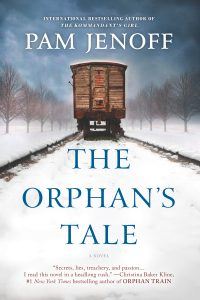 Pam Jenoff jokes that she could parade through an SJ bookstore wearing a nameplate, and nobody would connect the Cherry Hill resident to her novels.
Pam Jenoff jokes that she could parade through an SJ bookstore wearing a nameplate, and nobody would connect the Cherry Hill resident to her novels.
But during the everyday moments in life, she is sometimes stopped and recognized for her novels about ordinary women thrust into the chaos of World War II and the Holocaust. Fans might bring up “The Kommandant’s Girl,” a debut effort that catapulted to an international best seller some 10 years ago. Or they may refer to last year’s “The Orphan’s Tale,” her first work to make the New York Times Best Sellers list. In fact, Jenoff, who considers herself a “writer mom with a day job she loves,” is accustomed to encounters with readers when she is least in author mode – like when she’s changing in the locker room at the JCC gym or chasing after her kids at Johnson’s Farm. The low-key, casual fanfare suits her just fine.
“There are really three things I do: I write, I teach and I mom,” says Jenoff, 46. “I really love all three things.”
Much like the heroines of her novels, Jenoff’s journey to best-selling author owes much to being in the right place at a pivotal time in history – and rising to the occasion.
In the ’90s, when Jenoff was 24, she was assigned to the U.S. Consulate in Krakow, Poland, while working for the U.S. State Department. While living there, she made many personal connections in the Jewish community. Working to shape policy on how the former communist nation dealt with post-Holocaust issues, including preserving concentration camps, property restitution, anti-Semitism and setting history books straight, Jenoff became a sought-out expert on Polish-Jewish relations and the Holocaust.
“They grew to trust me,” she says of the Krakow survivors. “I wasn’t just a tourist popping in. I was there every Friday night constantly for years, and they became like family to me and shared their stories. When I left, I left a huge chunk of my heart over there.”
Following her work in Poland, Jenoff left the State Department bound for the University of Pennsylvania law school, and she took with her the stories of those survivors. Jenoff knew she wanted to write novels inspired by them and the tales they told – but life got in the way. While the stories marinated in her head, they never touched paper during those demanding school years.
Then fate played a role soon after Jenoff started her law career.
“I became a lawyer in Center City on Sept. 4, 2001,” she says. “Then 9/11 happened, and I had this huge life epiphany. Being a lawyer is all well and good, but I always wanted to be a novelist. If I was a 9/11 victim, I never would have done it. I realized I didn’t have forever to do this.”
Within weeks, she enrolled in a night course at Temple University titled, “Write Your Novel This Year.” And that’s exactly what she did. By establishing her habit of writing from 5 to 7 am before the work day began, Jenoff wrote “The Kommadant’s Girl” in just one year – but it took another five to get it published.
Coming at a time when novels set during World War II were enjoying popularity, the book still received 39 rejection letters. But then it was picked up by Mira, a subsidiary of Harlequin Enterprises. Jenoff’s story of Anna, a 19-year-old Polish girl forced to live a double life while working for the top man in Krakow’s Nazi headquarters, earned her a nomination for the Quill Award in 2007.
She has since published eight more books, including “The Last Summer at Chelsea Beach,” the only one of her novels set stateside. Ironically, Jenoff started the story of an Italian-Jewish refugee who finds a new life in Philadelphia and Atlantic City while she lived in Krakow.
She refers to her latest novel, 2017’s “The Orphan’s Tale,” as “the book that broke me.”
“It was a new level for me both creatively and commercially,” she says, noting that the story was inspired by documents she found in the archives of Yad Vashem, Israel’s Holocaust museum, both about a train filled with unknown children headed for the death camps as well as a circus that hid Jews while traveling through Nazi-occupied lands. “It was much darker and harder to write.”
Since her first event at the JCC to promote “Kommadant’s Girl” 10 years ago, Jenoff has been in high demand nationwide on the author scene – to the point that sometimes she has to turn down book-talk invitations.
“I appreciate the chance to meet people and love to go places, but it has to fit in with my schedule,” she notes. “It takes an entire village for me to go.”
That’s a shame for those who can’t be squeezed into her demanding schedule, because Jenoff’s talks are always entertaining and thought-provoking, says Sabrina Spector, who runs the JCC Bank of America Festival of Arts, Books and Culture.
“Book clubs love having her because she is so very approachable, humble and engaging,” Spector says. “No matter how many times you’ve heard her speak, she always brings something new to the table.”
Still, there is something special about her local engagements, which are often packed with relatives, friends and acquaintances. She is adept at speaking about sweeping moments in history, plot, characterization and even tying her stories to her life here in SJ, says Spector.
“Last year when “The Orphan’s Tale” went onto the New York Times Best Sellers list, it felt not just like a success for her and her family, but for all of us,” Spector says. “We had her for her first book when nobody knew her, and now she is this big best-selling author. We love that.”














